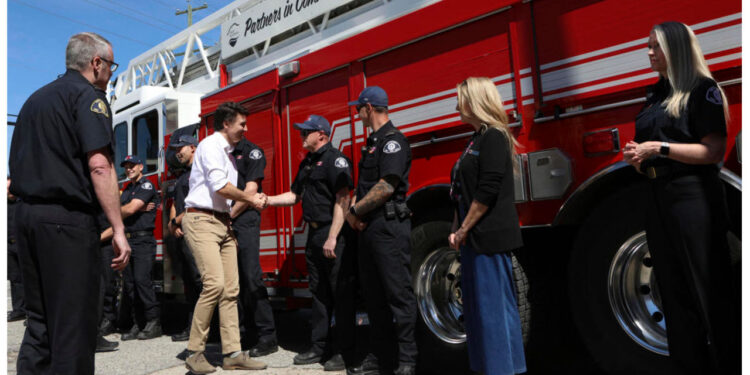The mayor of a Canadian town is preparing for what he believes could be the town’s final battle against a destructive, uncontrollable wildfire that has already engulfed over 13,000 acres.
The BC Wildfire Service reported that the Parker Lake Wildfire in British Columbia has expanded to cover 5,280 hectares or 13,047 acres as of Monday. The wildfire is currently classified as “out-of-control.”
During a briefing on Sunday, Cliff Chapman, the director of provincial operations at the service, stated that there has been a significant surge in wildfire activity in the vicinity of Fort Nelson.
According to a statement, the Parker Lake Wildfire initiated west of Fort Nelson on May 10 and displayed rapid growth and intense fire behavior. Responders were promptly dispatched to the area to aid in the preparation of the affected region and facilitate evacuations. The fire was propelled towards the community of Fort Nelson due to exceptionally strong winds and dry conditions.
According to him, the fire is described as “aggressive” and as a result, the highways in the vicinity have been closed.
Fire Chief Chapman urges residents in the evacuation order of the Parker Lake Wildfire, whether they are in Fort Nelson or elsewhere, to prioritize their safety and evacuate the area. He emphasizes the extreme dryness of the fuels, describing them as being at their driest ever recorded. With sustained winds forecasted, the fire is expected to advance towards the community. This poses a potential threat to escape routes, which may become compromised, and reduces visibility due to the growing wildfire.
Fire Behavior Specialist Ben Boghean expressed concern about the upcoming days, describing them as “challenging.” He emphasized that winds on Monday are projected to reach approximately 12.5 miles per hour.
According to officials, the community of Fort Nelson is expected to be affected by the fire on the morning of May 13. Although the fire behavior is anticipated to be slightly reduced on Tuesday, the threat of the fire will persist until rainfall reaches the area.
According to Boghean, the Parker Lake Fire coincides with the ongoing drought in the region, which has persisted for multiple years. The below-normal snowpack during the winter has exacerbated the situation. Consequently, the forests in the area are more susceptible to fires and their spread. Strong winds further contributed to the rapid growth of the fire, which expanded by nearly five miles within just four hours of its detection on May 10.
According to the expert, the rapid growth of the area’s forest fuels underscores their dryness and volatility. It also reveals the high potential for extreme fire behavior when sustained winds reach 15 kilometers an hour (about 9 miles an hour).
Rob Fraser, the mayor of the Northern Rockies Regional Municipality in Fort Nelson, expressed his concerns about the upcoming fire, stating that officials and responders are preparing for what could potentially be the town’s final battle against the blaze.
“The worst-case scenario,” he warned, “is that the fire, currently situated two to three kilometers away [less than 2 miles], could easily spread into the community if we experience strong westerly winds, similar to what we encountered on Friday. This would pose a significant challenge in our efforts to prevent its encroachment.”
Fraser reported on Sunday that there are still several dozen households, totaling up to 150 individuals, in and around the town who have not evacuated. He cautioned that if they choose to remain, they may experience a significant decrease in, or even a complete cessation of, electricity and water services, as these resources are diverted to support the firefighters.
“People will assume that they can rely on their own sprinklers and electric pumps to assist them,” he cautioned, “only to discover that the necessary resources have been depleted.”
The Canadian province is currently grappling with a staggering number of wildfires, with over 130 reported cases. What’s even more concerning is that eight of these fires have ignited in the last 24 hours alone, as reported by the B.C. Wildfire Service. While around 10% of these fires are currently listed as being out of control, the Parker Lake Wildfire stands out as the only one deemed “of note” by the agency. This classification indicates that the fire is highly visible or poses a potential risk to public safety.
Canadian officials had previously cautioned about the potential for another devastating wildfire season this year, following the destructive blazes of the previous year. As of now, the country has already recorded 823 wildfires in 2024, surpassing the 10-year average of 717. However, the total area burned by these fires is still lower than the average. Presently, there are six uncontrolled fires raging across Canada.
As of May 8, the National Wildland Fire Situation Report stated that the number of fires at this time of year is higher than average, while the area burned is lower than the 10-year average.
Last summer, the Canadian wildfires caused widespread smoke across several states in the U.S., making them all too familiar with this natural disaster. As of Monday, at least two states have reported air quality impacts. Minnesota, in particular, issued an air quality alert due to unhealthy conditions for sensitive groups in certain areas. However, it is expected that the conditions will improve as the day progresses.
According to the local National Weather Service station, Wisconsin is anticipated to experience a decline in air quality on Monday. However, there is hope for improvement later in the day.










